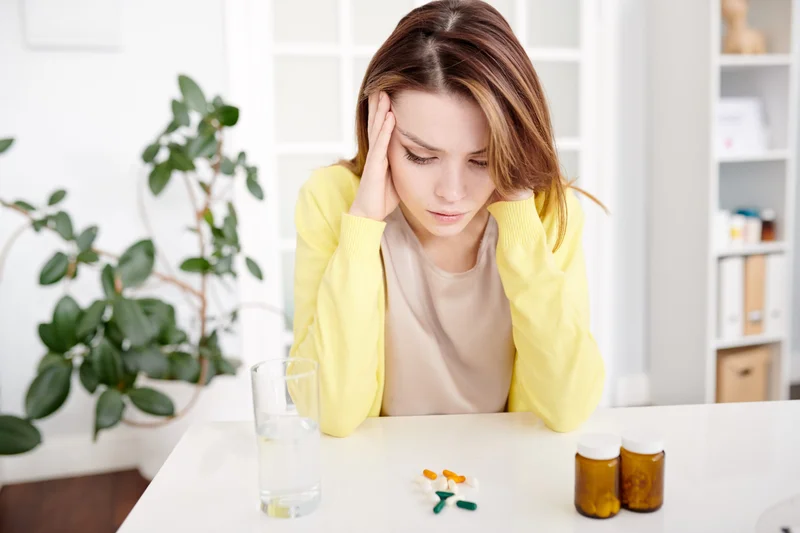Ask Ayurvedic doctor a question and get a consultation online on the problem of your concern in a free or paid mode. More than 2,000 experienced doctors work and wait for your questions on our site and help users to solve their health problems every day.
Hormonal Imbalance Treatment in Ayurveda

Hormonal imbalances can cast a far-reaching shadow over one’s overall well-being, affecting mood, energy levels, metabolism, and even reproductive health. In the ancient and holistic realm of Ayurveda, the traditional system of medicine born in India, there lies a comprehensive approach to addressing these imbalances. Ayurveda’s unique perspective posits that hormonal equilibrium is intrinsically tied to the balance of the three doshas – Vata, Pitta, and Kapha – and to the harmonious synchronisation of the mind and body. The various representations of hormonal disorders are hyper or hypothyroidism, menstrual disorders, PCOS, hyperprolactinemia, growth disorders, etc.
What sets Ayurvedic treatments for hormonal imbalances apart is their deeply individualised nature, carefully considering an individual’s unique constitution or Prakriti, and the current state of imbalance, known as Vikriti. This intricate system encompasses various facets of well-being, from diet and herbal remedies to lifestyle adjustments, yoga, meditation, detoxification therapies, and even Marma therapy, to promote balance and restore hormonal equilibrium.
In the following exploration, we delve into the holistic and personalised approach of Ayurveda in treating hormonal imbalances, delving into the age-old wisdom that seeks not only to address symptoms but to rectify the root causes and revitalise the entire mind and body.
Some of the hormonal imbalance treatments in Ayurveda are:
Diet and Nutrition:
In Ayurveda, individuals are classified into three main types of doshas: Vata, Pitta, and Kapha. Your Ayurvedic practitioner will assess your constitution (Prakriti) and current imbalances (Vikriti) to recommend a diet plan tailored to your specific needs. For hormonal balance, the emphasis might be on incorporating whole, unprocessed foods, and avoiding processed, heavy, or overly spicy foods.
Depending on your dosha and imbalance, you may be advised to include certain foods or herbs in your diet. For instance, individuals with Vata imbalances may be encouraged to consume grounding foods like root vegetables and warming spices like ginger.|
Ayurvedic medications:
Ayurveda relies on a vast pharmacopoeia of herbs. In the case of hormonal imbalances, different herbs can be used based on the specific condition. Ashwagandha, for example, is an adaptogenic herb that can help reduce stress and cortisol levels, promoting hormonal balance.
Shatavari, often referred to as “the queen of herbs,” is renowned for its benefits to the female reproductive system, helping to regulate menstrual cycles and alleviate menopausal symptoms.
Similarly, dashamoola, trikatu, bala, eranda, shunthi, dhanyaka, musta, lodhra, ashoka are other medicines that are extremely beneficial in managing hormonal issues.
Medications that act on Rasa dhatu, Shukra dhatu , Agni are chosen by the physician according to the case.
Lifestyle Changes:
Ayurvedic daily routines, or dinacharya, can play a crucial role in maintaining hormonal balance. This may involve waking up early (Brahma muhurta), practising tongue scraping and oil pulling, and engaging in self-massage with oils (abhyanga).
Stress management is integral in Ayurveda. Chronic stress disrupts the balance of hormones, and daily practices such as meditation, pranayama (breath control), and mindfulness can help reduce stress levels.
Yoga and Meditation:
In Ayurveda, yoga is considered a holistic practice that addresses physical, mental, and spiritual well-being. Specific yoga postures, like forward bends and twists, can stimulate or relax specific glands associated with hormone production. Meditation, particularly mindfulness meditation, can have a calming effect on the nervous system, reducing stress hormones like cortisol.
Panchakarma:
Panchakarma is a deep detoxification process that aims to eliminate toxins and impurities from the body. It involves multiple stages, including oil massage (snehana), steam therapy (swedana), and purgation (virechana), among others. Panchakarma is believed to reset the body’s balance, cleanse the tissues, and promote hormonal equilibrium.
Ayurvedic Medicines:
Ayurvedic practitioners may prescribe specific formulations or combinations of herbs. These can be prepared as powders, pastes, decoctions, or pills. For instance, in cases of thyroid imbalances, Ayurvedic medicines may contain herbs like guggul to support thyroid function. Medications like Kanchanar guggulu, gokshuradi guggulu, Arogyavardhini, triphala, trikatu, agni tundi, chandraprabha, shaddharanam churna, amrittottaram kashayam etc are used to manage various types of hormonal disorders according to Ayurveda.
Marma Therapy:
Marma points are considered vital energy centres. Ayurvedic practitioners use marma therapy to stimulate or calm these points, influencing the hormonal glands and energy flow in the body. Marma therapy can be incorporated into massages or as a standalone therapy to address hormonal imbalances.
In conclusion, Ayurveda’s approach to treating hormonal imbalances is a testament to the time-tested wisdom of this ancient healing system. It offers a holistic and personalised path to not only alleviate the symptoms of hormonal disturbances but to address the underlying causes and restore a state of balance and vitality. By understanding the interplay of doshas, the importance of diet, lifestyle, and the therapeutic applications of herbs, yoga, meditation, and even Marma therapy, Ayurveda provides a comprehensive and individualised roadmap to hormonal harmony.
The beauty of Ayurveda lies in its recognition that each person is unique, and thus, treatments should be tailored to their constitution and specific imbalances. It stands as a valuable complement to conventional medical approaches, emphasising the importance of a balanced and harmonious life to promote overall well-being. For those seeking a holistic and personalised approach to hormonal balance, Ayurveda offers a rich tapestry of ancient wisdom and healing techniques.
Get Free Pre-ayurvedic consultation today!
Ask-Ayurveda is a platform that helps connect patients with Ayurvedic doctors through online Ayurvedic consultation in order to get proper treatments for their problems. Ask-Ayurveda offers consultations for health and lifestyle-related issues and provides appropriate measures and regimens in order to alleviate the issue. For a detailed consultation regarding the lifestyle, reach out to our experts at Ask-Ayurveda. For a balanced health get free pre ayurvedic consultations today itself with Ayurveda.

